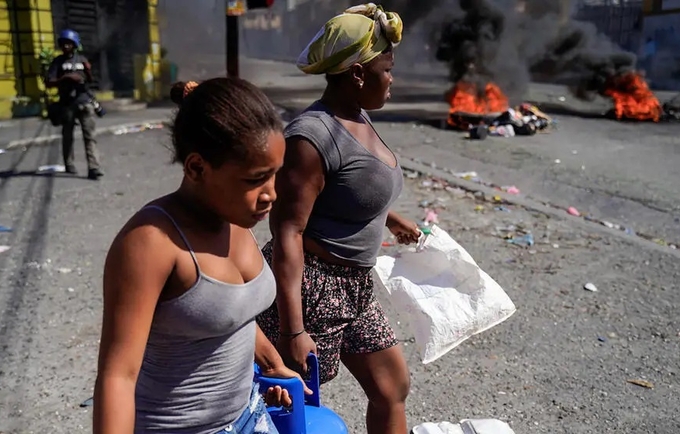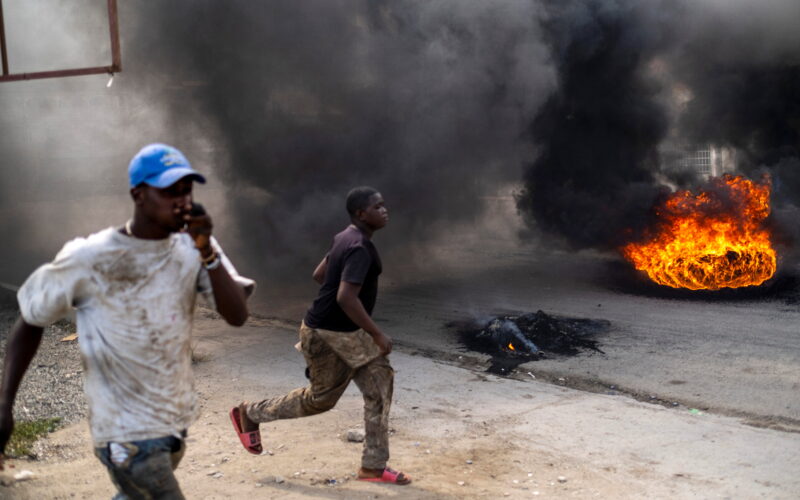PORT-AU-PRINCE (AP) — Haitian Prime Minister Ariel Henry urged calm in a public address early Thursday following three days of violent protests that have paralyzed the country as thousands of protesters demand his resignation.
The brief speech in the pre-dawn hours did little to appease people who are angry and frustrated over unrelenting gang violence, deepening poverty and the lack of any plan in sight for general elections.
“I think the time has arrived for all to put our heads together to save Haiti, to do things another way in our country,” Henry said without offering specifics.

He urged Haitians not to look at the government or at Haiti’s National Police as their adversaries. Those who choose violence, destruction and killing people to take power are “not working in the interests of the Haitian people,” he said.
Haiti’s legislature is currently empty, after the terms of its last 10 senators expired in January 2023. The country failed to hold planned elections in 2019 and 2023, and Henry assumed power with the support of the international community following the July 2021 assassination of President Jovenel Moïse.
Henry’s comments come as thousands of Haitians gathered daily this week in cities and towns across the country to demand that the prime minister step down, saying they will keep protesting until he leaves.
Protesters have used tree branches, dilapidated cars and burning tires to block roads as some crowds attacked businesses and government buildings, leading to clashes with police who have fired tear gas and live bullets.
The demonstrations have forced at least 1,000 schools across Haiti to temporarily close, as well as banks, government agencies and private businesses.
Critical humanitarian aid also dwindled amid the chaos, and food prices spiked by more than 20% in some areas as a result of the ongoing blockades, according to a report from the U.N.’s Office for the Coordination of Humanitarian Affairs.
On Wednesday, police killed five armed environmental protection agents in the capital of Port-au-Prince in a shooting some worry could worsen Haiti’s crisis.
Lionel Lazarre, head of a police union known as Synapoha, told The Associated Press that the shooting between police and agents with Haiti’s Security Brigade for Protected Areas occurred in the Laboule community. He claimed that the environmental agents opened fire after police asked them to drop their weapons, prompting officers to shoot.
Clashes between the environmental protection agents and police have erupted since January, leading Henry to announce a restructuring of the environmental agency and the dismissal of its chief.
On Thursday, former rebel leader Guy Philippe, who made a surprise appearance in Port-au-Prince earlier this week, criticized the international community for backing Henry and urged environmental protection agents to take a stand and seize control of the regions where they work. He called on the agents, as well as the police and army, to “neutralize” anyone who supports Henry’s government.
“This is the only way we are going to show them that we are not playing,” he said in an interview Thursday with Radio Caraibes. “We have to get ready to attack them.”
In a statement on Thursday, Haiti’s Office of Citizen Protection condemned the killings of the environmental agents and called for an independent commission to investigate the incident.
It also said three journalists in the southern coastal city of Jeremie were injured by bullets while covering protests and accused police of seizing reporters’ equipment in the northern coastal city of Cap-Haitien, calling the incidents “serious attacks on press freedom.”
In his speech, Henry said Haitians need peace, security, work and the ability to move freely around the country.
“Haitian people need for their children to go to school without fear, because that’s what’s going to guarantee them a future,” he said.
Hours after his speech, the streets in Port-au-Prince and surrounding areas remained calm through late Thursday afternoon.
Jean-Robert Simon, a high school math teacher, took advantage of the respite to stock up on onions, tomatoes and other vegetables. Like many Haitians, he fell asleep before Henry addressed the nation, but caught up with a morning newscast.
“The whole speech to me was propaganda,” he said, adding that he felt it was provocative and angered many Haitians because Henry didn’t announce he was stepping down.
Simon said he feels Henry has been dragging his feet on holding general elections as gang violence worsens to the point where his two children are unable to go to school and are instead taught at home by his wife.
“We’re not going anywhere with Ariel,” said Simon, 39, who accused the international community of working with the prime minister to drag Haiti deeper into a hole. “Ariel is the past. If he doesn’t recognize that, the country will eventually make him recognize it.”
In his speech, Henry once again pledged to hold general elections as soon as Haiti’s insecurity issues are resolved, saying he would continue to reach out and work with all those who want the country to move forward, “to take decisions together that are going to help us emerge from the crisis.”
He also congratulated police for their efforts in fighting gangs and promised he would keep pushing for the U.N.-backed deployment of a Kenyan police force that is currently blocked by a court order.
“I want to reassure everyone the government will do whatever it can for the mission to come as fast as possible,” he said.
Henry also extended his sympathies to all those who have died in the violent protests this week.
“I give you assurance that the Haitian people will have peace and development with prosperity,” Henry said, without providing details. “Together, hand-in-hand, we will change our destiny.”
Haitians said they wanted Henry to step down by February 7, the date Haitian leaders are typically sworn into office. The date also carries deep historical significance in Haiti: On that date in 1986, former dictator Jean-Claude Duvalier fled for France, and in 1991, Jean-Bertrand Aristide, Haiti’s first democratically-elected president, was sworn in.
By DÁNICA COTO AND PIERRE-RICHARD LUXAMA/Associated Press
Associated Press reporter Evens Sanon contributed.
Coto reported from San Juan, Puerto Rico.

